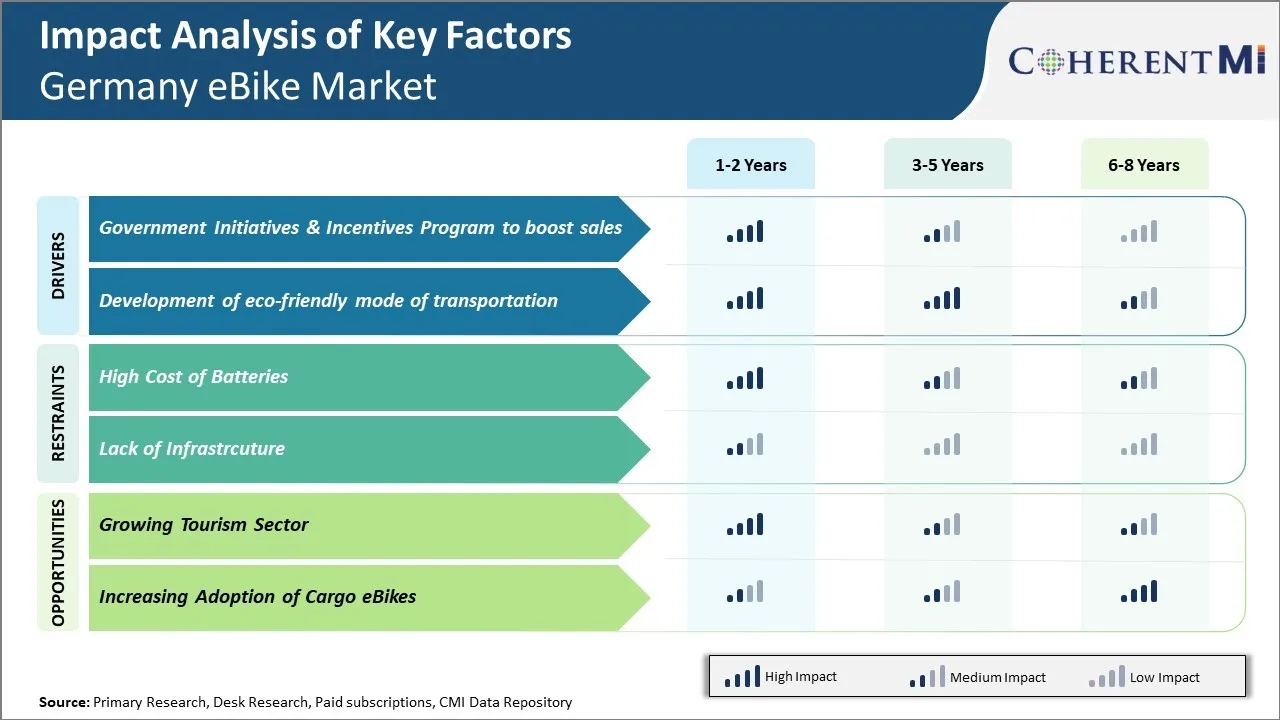Germany eBike Market Trends
Market Driver – Government Initiatives & Incentives Program to Boost Sales
The German government has introduced several purchase incentives and subsidy programs over the past few years to promote the adoption of electric bicycles (eBikes) in the country. Through initiatives like the Electrical Drive Bike Subsidy Program, the government provides citizens a 20% subsidy on the purchase price of a new eBike, up to a maximum of €600 per person. This has made eBikes much more affordable for the average consumer. According to official government data, over 500,000 eBikes received subsidies under this program in 2021 alone. The rising demand has forced domestic eBike manufacturers to rapidly scale up production.
The government also engages in extensive promotional campaigns encouraging the use of eBikes for short-distance commutes as an eco-friendly alternative to private vehicles. Municipal authorities across major cities are working to develop dedicated cycling infrastructure such as protected bike lanes. For example, in Hamburg over 500km of new bike lanes were added in 2022 according to the city's transport department annual report. Such initiatives aim to make cycling a safe and viable mode of transport. They have contributed to a change in public perception and increased social acceptance of eBikes over the past few years.
Market Driver – Development of Eco-friendly Mode of Transportation
The development of eco-friendly modes of transportation is a major driver for the growth of e-bike market in Germany. More and more German consumers are looking for ways to commute in a sustainable way. E-bikes provide an environmentally friendly alternative to conventional petrol vehicles for short-distance commuting within cities. They help reduce dependency on fossil fuels as well as emission of exhaust gases. Additionally, e-bikes offer a viable solution to issues like traffic congestion and lack of parking spaces in densely populated urban areas.
The German government has been actively promoting the adoption of e-bikes through various incentives. Substantial investments have been made in expanding the national cycling infrastructure network which includes separate bike lanes, bike-sharing facilities etc. According to German Federal Ministry of Transport and Digital Infrastructure, the country plans to invest 4.5 billion euros until 2023 to develop over 5000 km of additional cycle paths. This is expected to make cycling a far more attractive daily transportation option.

Market Challenge – High Cost of Batteries
The high cost of batteries has been one of the major limitations restraining the growth of the eBike market in Germany. E-bikes require lithium-ion batteries that make up almost a third of the total manufacturing cost. These batteries are expensive to produce due to the significant amounts of rare earth materials required and complex cell manufacturing processes involved.
For many potential consumers, the upfront cost of purchasing an e-bike, which is significantly higher than a conventional bicycle due to the battery cost, acts as a deterrent. This is especially true at a time when people's budgets are already stretched due to high inflation. While the longer-term savings on energy and maintenance make e-bikes an efficient option for daily commutes, the high initial investment poses a challenge. This consumer reluctance has held back stronger demand growth for e-bikes in Germany.
Furthermore, the battery life is also a concern. Lithium-ion batteries have a limited number of charge cycles before their storage capacity decreases substantially. Battery replacement can add considerable recurring costs over the e-bike's lifetime.
Market Opportunity – Growing Tourism Sector
Germany has a growing tourism sector which can provide a great opportunity for the eBike market in the country. With more tourists visiting nature spots, trails and rural areas each year, the demand for comfortable and easy cycling options is increasing rapidly. ebikes have emerged as a convenient solution that allows people of all ages and physical abilities to explore places comfortably without getting tired easily.
Tourists are looking to experience Germany’s beautiful countryside, lakeside trails and mountainous terrains in an immersive way. ebikes enable them to cover longer distances and traverse varied terrains with minimal effort. This makes cycling a far more viable option for family vacations and group tours compared to other modes of transport. The assistance provided by the electric motor allows people who otherwise may find travelling on cycles challenging due to health, age or fitness levels to fully enjoy cycling tours. Cycling tourism is projected to see strong growth across Germany's rural areas in the coming years according to latest estimates by government agency Federal Ministry for Economic Affairs and Energy.